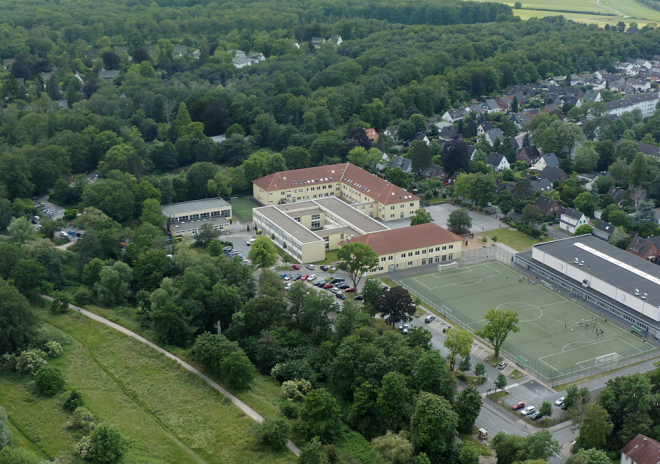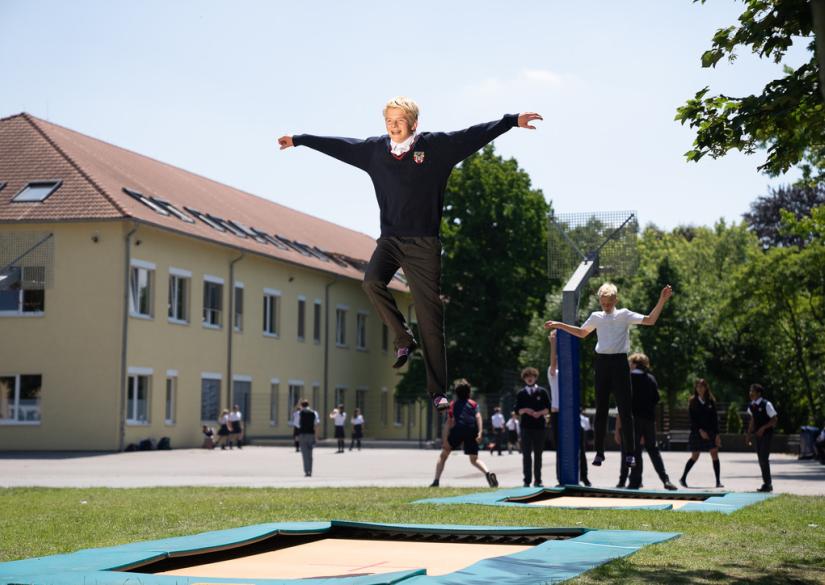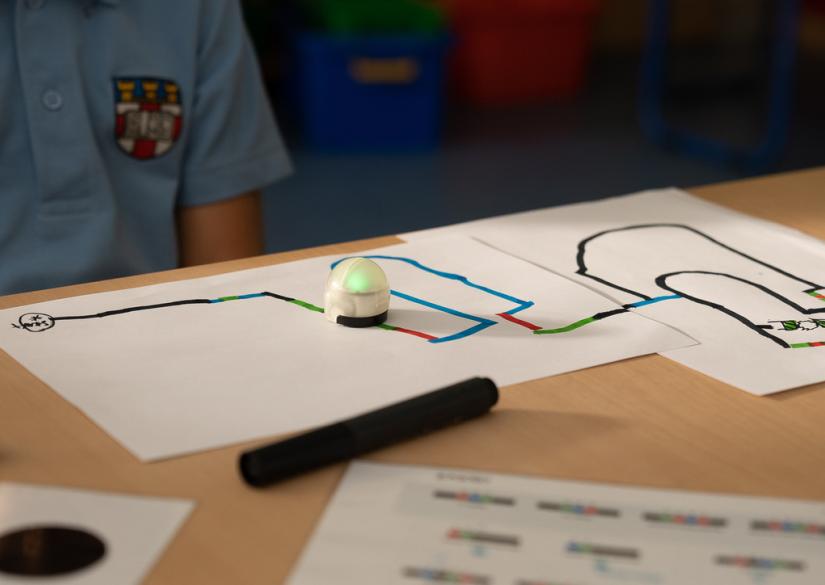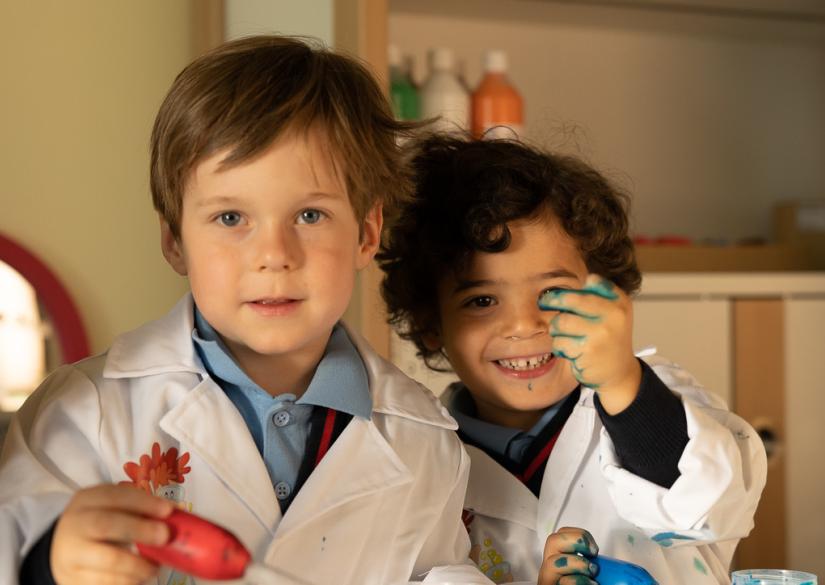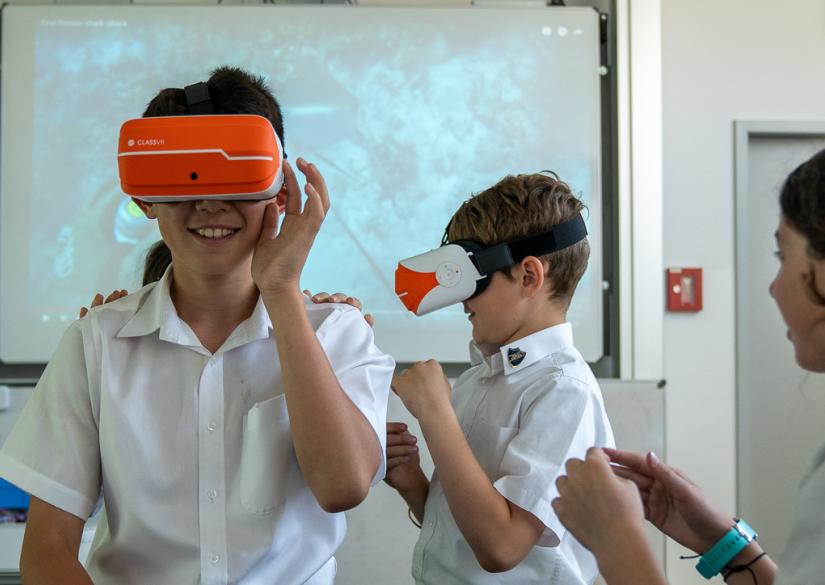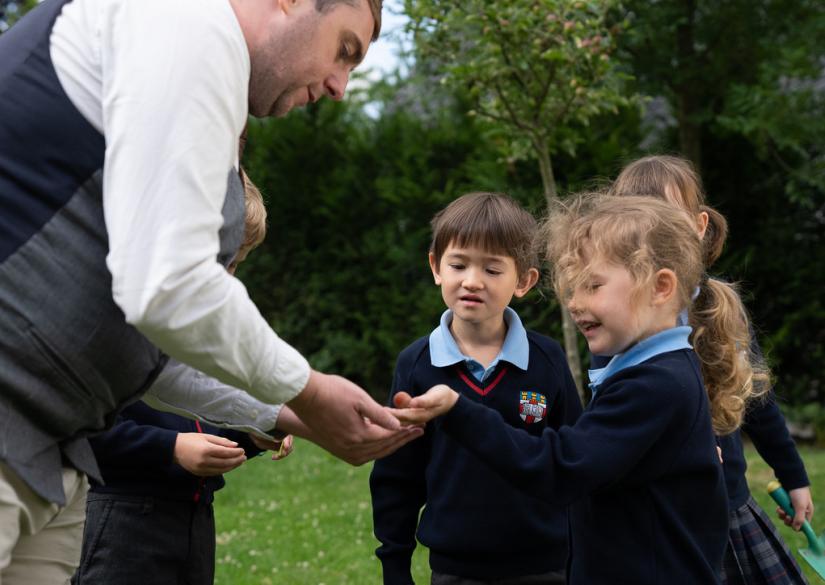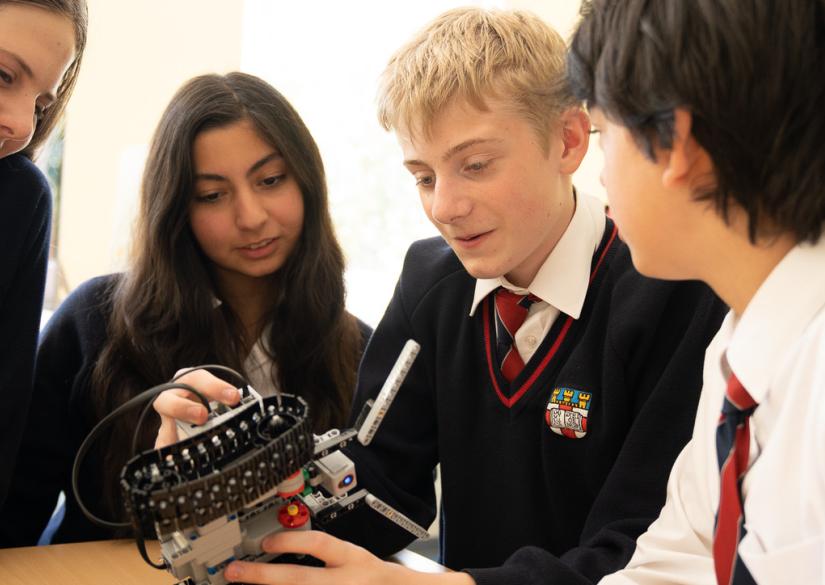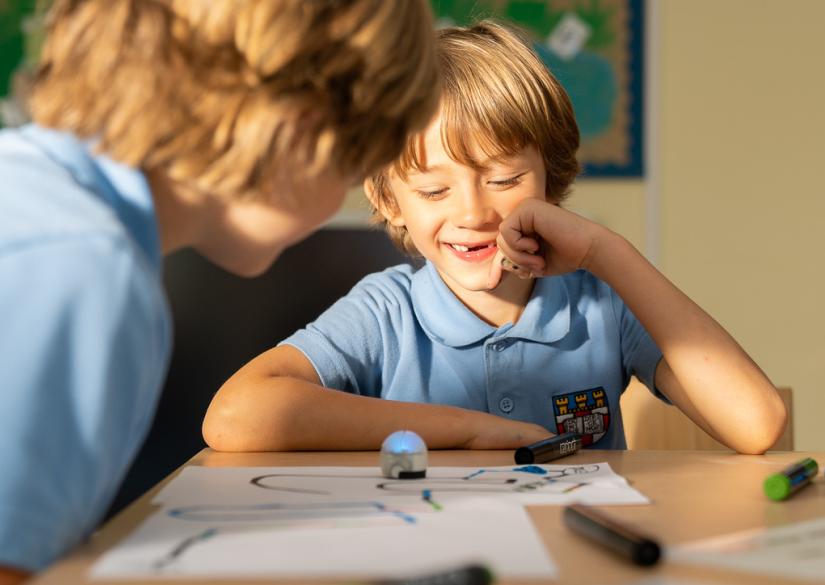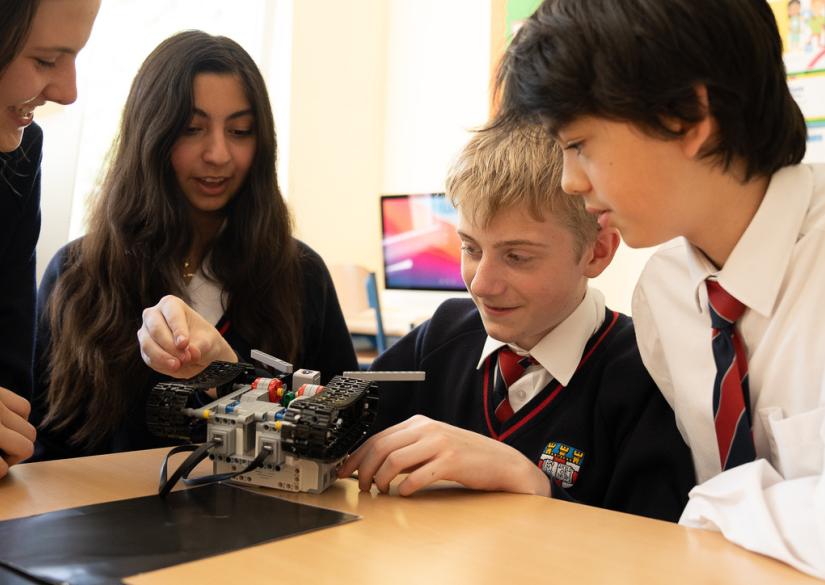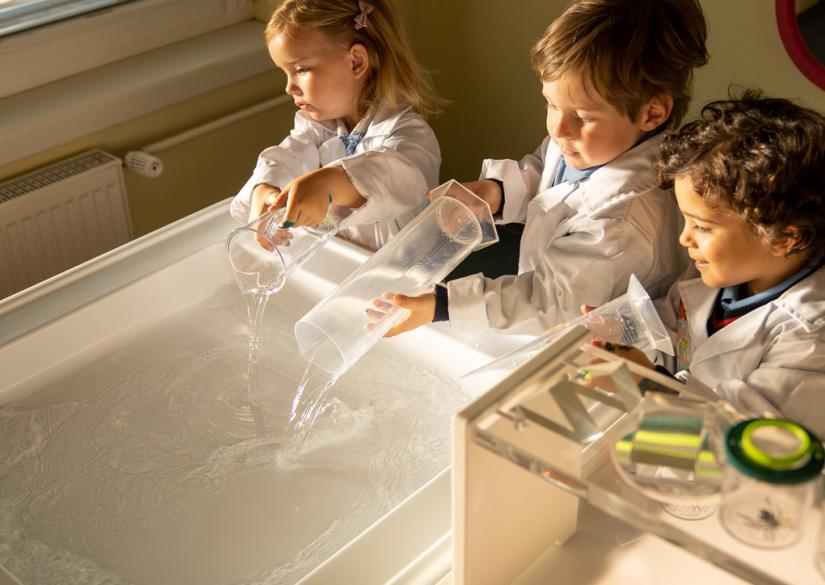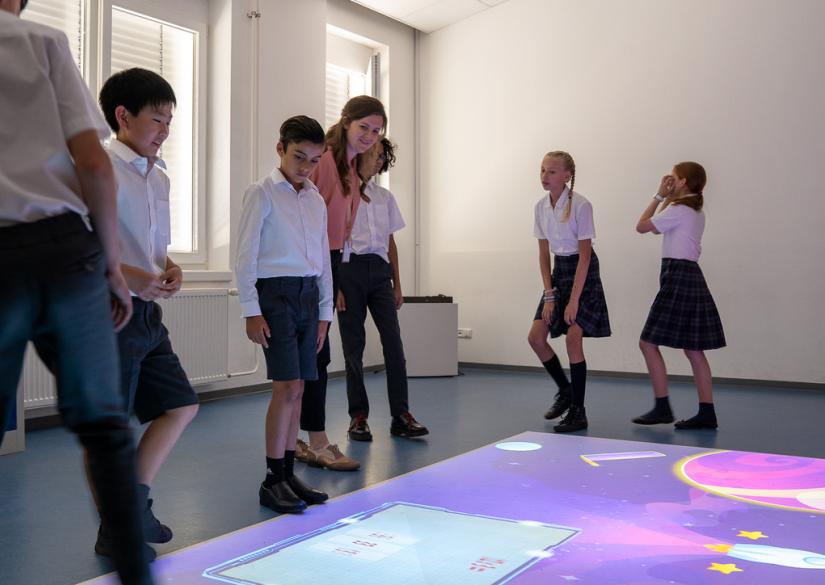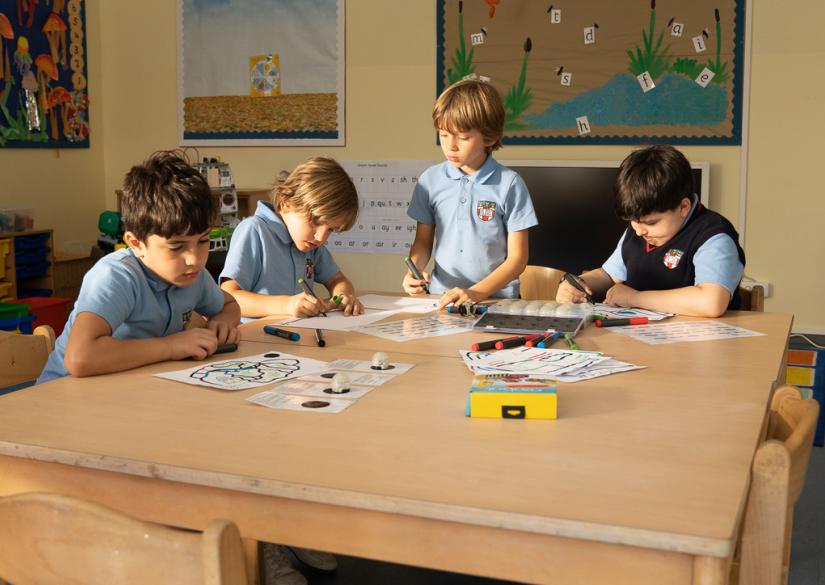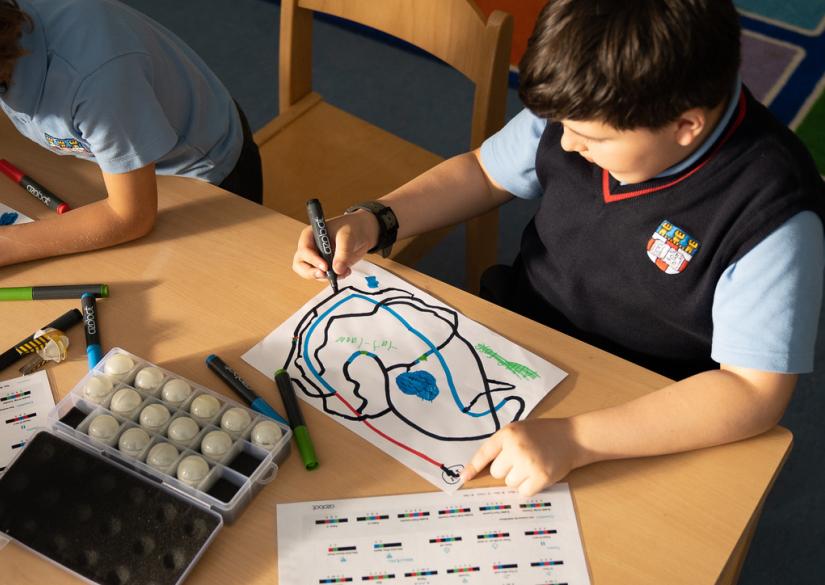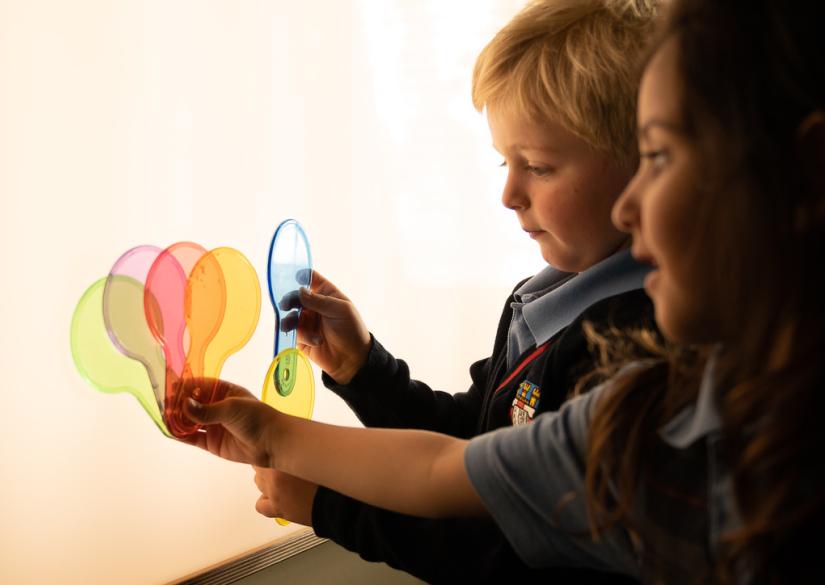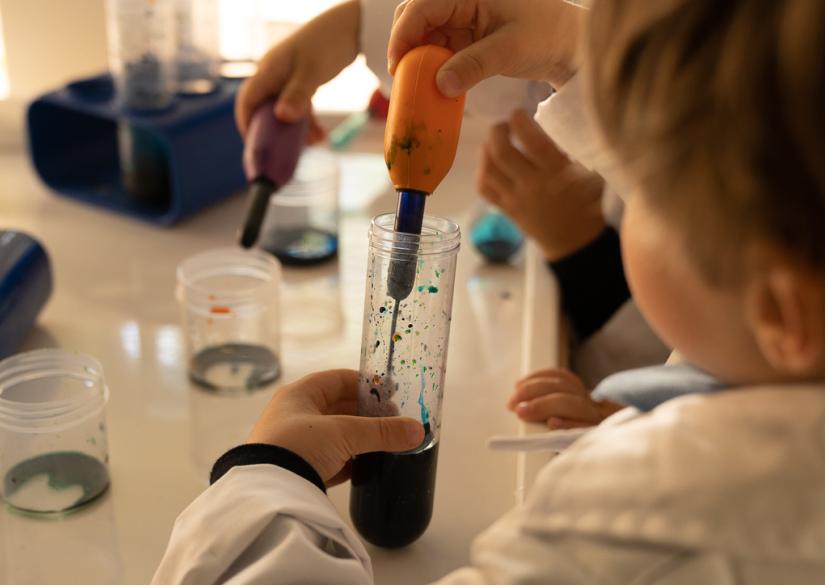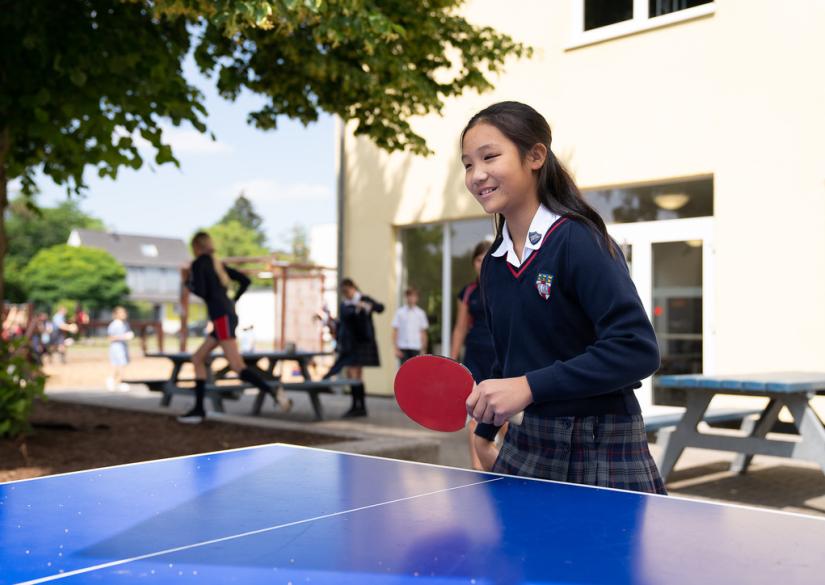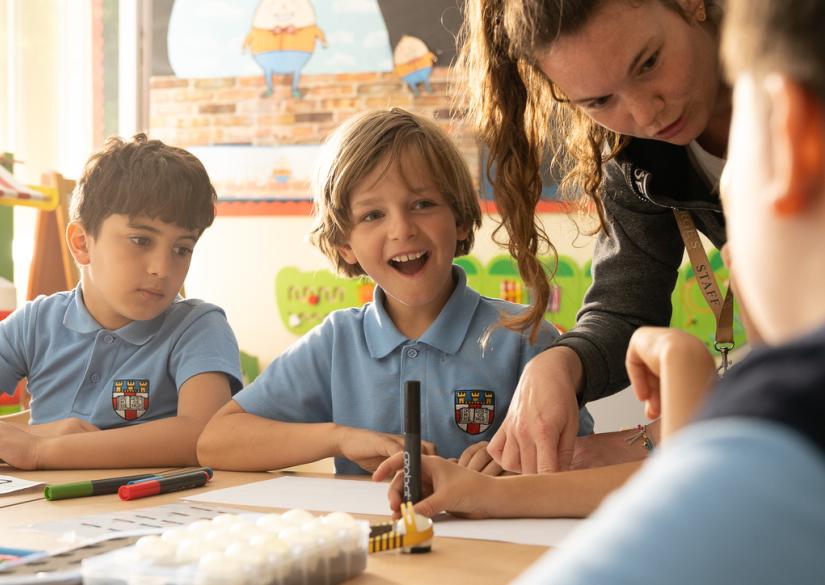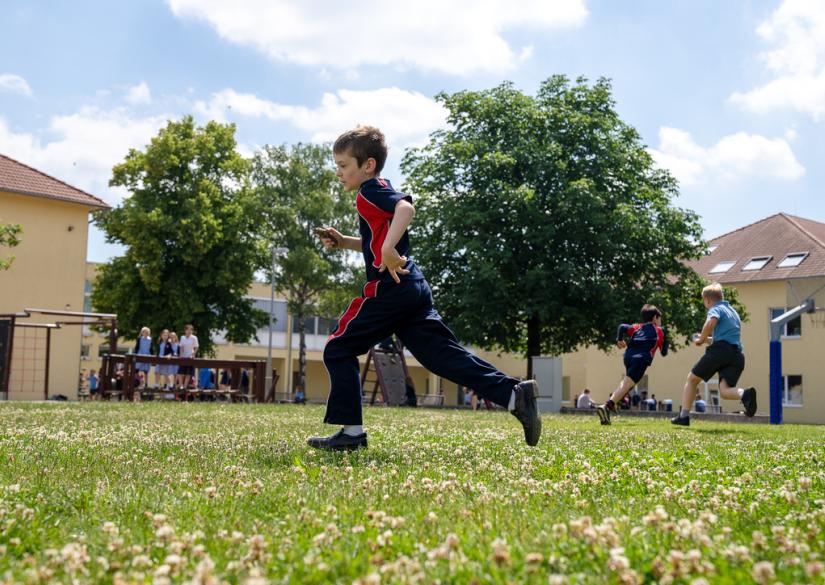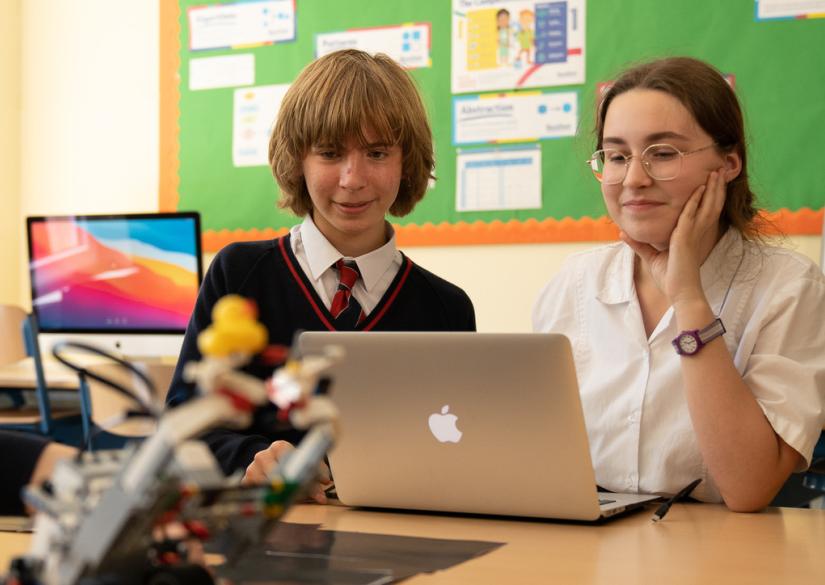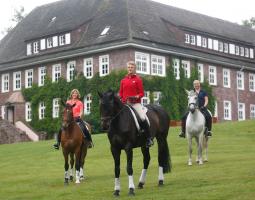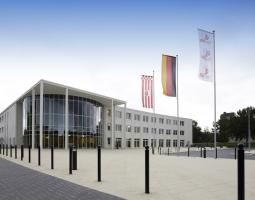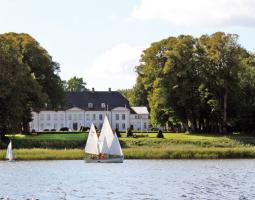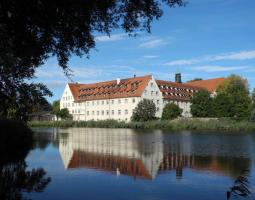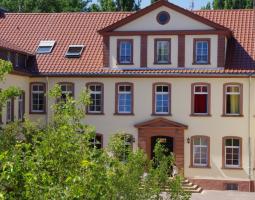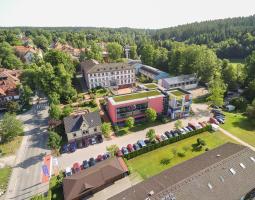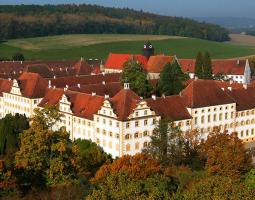St. George's School in Dusseldorf
Programs and prices, tuition fees in St. George's School in Dusseldorf
Studying is conducted on the basis of English language, taking into account the requirements of German state standards. Beginning with junior classes, students of St George's School Duisburg in Düsseldorf wear school uniforms. The institution establishes close relations with parents, invites them to open days, festive evenings.
The school educates the children in good manners, courtesy and mutual assistance. Classes do not exceed 20 people, often children from different countries are in one group. English education system provides the passage of the basics of mathematics, geography, history, natural subjects, computer science. English and German are basic. In addition, children are engaged in art, dance, sports and French. Drawing lessons are provided for everyone.
In the open air, students spend a large part of the after-school studying. The school offers classes in gardening, outdoor games, yoga. You can learn to play a musical instrument, to sing in the choir, or to attend debates, books, theatrical circles.
Individual approach to each child allows reaching a high level of education, examinations are held every six months. Monthly schoolchildren are assessed by performance in subjects. English, German and mathematics are given the largest number of academic hours. Children also study chemistry, computer technology, English literature, history, physics and geography. As a second foreign language, French can be studied.
For the development of flexibility of thinking and imagination, the school offers courses in drawing, performing arts, and music. Sports activities are compulsory. Extracurricular activities are the following:
- Football;
- School newspaper;
- Participation in musical groups;
- Scientific research clubs;
- Computer club;
- Basketball;
- Drama;
- Cricket.
Parents are personally informed by their curators not only on subject rankings, but also on the level of social integration of their child.
The school in the upper grades (14-16 years) adheres to the requirements of English standards. Exams are awarded internationally by I / GCSE. The successful passage of the program involves the study of:
- English;
- One humanitarian subject;
- Mathematics;
- Natural sciences;
- Foreign language.
As a humanitarian science, most children choose English literature.
In order to pass a single national examination, subjects are required:
- German;
- Physics;
- Geography;
- Spanish;
- Chemistry;
- Information technology;
- Historical science;
- French;
- Biology.
It is admissible to study art or music on an academic level.
The school assesses the successes of students in the classroom, while doing research and independent assignments. Practical courses take place in laboratories. Examinations for I / GCSE are accepted by a London or Cambridge commission.
Children spend their leisure time visiting geographic, chemical, physical circles, theatrical drama studio, sports leadership classes or a literary club. Mugs of foreign languages, musical groups and playing chess are popular.
The program provides for preparation for higher education and takes into account the specifics of the studying of foreign students. This is the final universal course that allows you to get IB Diploma (certificate of full secondary education).
An obligatory component for all courses is the study of the theory of knowledge, CAS (creativity, activity, service) and studying course of volume analytical essay. The schoolchildren undergo three science of standard complexity, three - advanced (HL). German and English allow entry levels A1 and A2. The students can also learn French and German at level B (self-possession).
The study of geography, chemistry, visual art, economic theory, historical knowledge, biology, physics and mathematics is foreseen.
For admission to high schools of Germany you will need to pass at the level of HL (complicated) mathematics or biology, physics, chemistry. Preparation for International Baccalaureate with high scores will allow to enter the British ranking universities.
Pre-Nursery & Nursery Programme
- Age — from two to four years old,
- Duration of study — three years.
The preschool education preparatory program is focused on the comprehensive development of children aged 2 to 4 years. At the early learning stage, games, entertainment and timely rest are important for children, which form the basis of the curriculum. Over several years, qualified teachers educate junior students in seven areas:
- Mathematics,
- Expressive art, design,
- Literacy,
- Communication, language
- Physical development,
- Personal, social, emotional development
- Understanding the world.
Classes are held in small groups under the supervision of a teacher and his assistant. The main focus is on interdisciplinarity: students are taught the basics of subjects in a playful format, and the curriculum is supplemented with lessons in crafts, sports training, drawing, singing and other activities.
Description of St. George's School in Dusseldorf
- Year of foundation: 2002
- Location: Germany, Duisburg-Dusseldorf
- Age of students: 14 -18 years old
- Type of edication: mixed
- Programs: Primary, Secondary School, IB, GCSE
- Accommodation: day school
- Ranking: a prestigious British school, one of the best in Germany.
St. George's School in Dusseldorf is one of the first British schools in Germany. The campus in Dusseldorf was opened in 2002. St. George School Dusseldorf is a full-cycle educational institution. Here programs of a kindergarten, elementary, high school are offered. Foreign students are admitted to the language school from the age of 10 (unaccompanied by the parents, to full board) and from 2 years with the family residing in Germany.
The campus of the school is conveniently located in a picturesque suburbs. The territory of the school is landscaped. The campus has everything you need for living, studying and relaxing. After lessons,students are offered a rich extra-curricular program. It is represented by creative circles, recreational activities, and sports.
Junior students can study:
- Sewing circles;
- Information technology;
- German theater;
- Celtic and variety dances;
- A foreign language (Spanish);
- Sing in the choir;
- Be engaged in music.
For toddlers clubs of reading, art, debates, and mass media are also opened. Sports fans are offered yoga, outdoor games. For senior students there are subject clubs (physics, chemistry, mathematics, biology, geography, literature), classes in a music, theater, chess club.
The language school implements an individual approach to foreign students. Here, each child receives the maximum amount of attention from teachers, who are native speakers of English. The school has a family atmosphere. This contributes to the creation of conditions that are optimal for the development of children.
Educational process
At all stages of school education, teaching is conducted in English. German is compulsory to study until the age of 16, and then becomes an elective subject. In addition to these languages, students can choose French or Spanish to study from the age of 9.
Each student receives language support if necessary — teachers organize individual lessons and classes in small groups, paying attention to pupils to achieve their goals.
A career department also operates here, providing assistance to high school students preparing for university admission. Department employees conduct individual and family consultations, classes on the development of personal qualities, so that the student achieves their goals.
Faculties and colleges
Based on an internationally recognized program and the National Curriculum for England, Wales and Northern Ireland, teaching is available here at all stages of school education: preparatory, primary, secondary and senior.
Things to know about
School uniform is a mandatory attribute for education: clothing of the same color and distinctive signs on it create a strict academic atmosphere and unite the student community.
Accommodation, meals, prices
A full-time education format is provided for the students of the school, children need to live with their parents or official guardians.
Subjects and sports
Activities St. George's School in Dusseldorf
A House system has been created at the school, which involves dividing students into four large groups with distinctive signs: Chaucer, Brontë, Dickens, Shakespeare. Throughout the year, many competitive events are held, including sports and creative ones, during which Houses and individual participants earn points. At the end of the year, a ceremonial evening is organized where outstanding students and the House that scored the most points are awarded.
After lessons on weekdays, various clubs operate on campus: sports, creative, scientific, and charitable. By joining them, a student will be able to develop their talents, find a new hobby, and find like-minded people. Sports sections led by professional coaches train teams that participate in various competitions with other schools and clubs throughout Germany and abroad.
Several extracurricular development opportunities:
- The Duke of Edinburgh's Award — an international program offering students to participate in social, recreational, and research projects. The award promotes the personal and social development of participants, allowing them to acquire important life skills: adaptability, problem solving, time management, and the ability to accept criticism and learn from it. The award can be obtained at three levels: «Bronze», «Silver» and «Gold», each of which becomes increasingly difficult,
- Music Academy — highly qualified, experienced musicians offer lessons in playing musical instruments such as piano, violin, drums, guitar, trombone, trumpet and others. In addition, students will be able to participate in various ensembles, orchestras and groups, study different styles of dance.
St. George's The British International School staff organize regular trips for students of all ages to expand their educational experience, provide an opportunity to learn about the history, culture and customs of the region. In addition to day trips for pupils in grades 4-10, longer excursions with accommodation are also organized so that students can gain expeditionary experience, acquire important life skills, and enjoy a rest outside the campus.
Advantages
- The school in Dusseldorf is a British educational institution in the German environment. Here students can get acquainted with the peculiarities of two cultures, improve the skills of English and German.
- St. George's School Dusseldorf is known for the high level of academic preparation. The average score for IB here ranges from 33 to 35 points.
- The school offers a wide variety of programs.
- Graduates of the school can enter any British university in the English-language course.
- Small groups of students at the school ensure the effectiveness of studying process .
- Home atmosphere in the school facilitates the rapid adaptation of children to a new environment.
- A wide range of circles and a rich extracurricular program is provided.
- The school pays much attention to discipline. Students here are in the classical British academic environment. This allows them to focus their attention and efforts on achieving educational goals.
Facilities and equipment at St. George's School in Dusseldorf
Classes, research laboratories, a library are located in the main building of the school in Dusseldorf. Here it is located a computer, multimedia center. Also in the building there is a rest room for students, a dining room.
Sports infrastructure of the Dusseldorf school is provided for foreign students. George's is represented by a variety of playing fields. Students can play:
- Volleyball;
- Football;
- Basketball;
- Cricket;
- Rugby;
- Field hockey.
Also part of the sports infrastructure is a fitness room, a sports center, a dance studio.
For the creative development of children in the school there are clubs on interests. Audiences for art, music, design are located in the main building.
Admission dates and extra charges
The institution operates according to an annual schedule that includes three trimesters:
- Autumn: August-January,
- Spring: January-April,
- Summer: April-August.
Classes are held on weekdays, and breaks are organized on weekends, national and international holidays, and during seasonal vacations. The longest break falls in the summer months — from May to September.
The daily schedule of students varies depending on the class: children in the preparatory department study from 8:00-8:45 to 15:00-16:45, and students in primary, middle, and high school — from 8:30-8:45 to 16:45. This time includes academic and extracurricular activities.
The list of additional expenses includes:
- Registration fees,
- Individual meal plan,
- School uniform,
- Individual learning materials,
- Additional academic support,
- Some extracurricular activities,
- Personal expenses.
Extras:
- Registration fee (for a programme/course) 750 EUR
- Application fee 4500 EUR
- Study materials 135 EUR
Enrolment process
Before submitting an application, prospective students are advised to visit the campus to meet teachers, explore the educational facilities and learn about the program. Students have the opportunity to spend a trial day in class to understand if the school is right for them. If these events cannot be attended, the admissions office staff will offer to connect with parents online to answer any questions they may have.
Applications are accepted throughout the year. Candidates need to complete an application form and attach the required documents, pay registration fees, and take entrance exams – tests to determine their knowledge level. Upon successful completion of the testing, future students will receive an official invitation to study, followed by a deposit payment to reserve a place in class. The campus will be waiting for new students at orientation events and upcoming classes.
Enrolment statistics
Admission of new students is based on submitted academic transcripts and the results of entrance tests. The school does not rely solely on academic excellence, considering each application individually.
Perspectives
Graduation programs offer high school students exceptional quality of education, practical skills and competitive diplomas that are recognized by many leading universities around the world. Graduates successfully enroll in universities, institutes and colleges in Germany, the USA, Great Britain and other countries.
Entry requirements, how to apply, what is required to enrol
International applicants must have personal documents: a foreign passport, health insurance and medical certificates, a visa or residence permit for studying in Germany. Applicants to elementary, middle and high school should provide academic transcripts that will show the admissions committee their existing knowledge base obtained at their previous place of study. Proficiency in English is important for effective studies, however, applicants who do not have sufficient proficiency are also accepted — these applicants are offered additional language support.
Scholarships St. George's School in Dusseldorf
The school annually allocates a limited amount of financial aid intended for students with excellent academic performance who are unable to fully cover the cost of tuition.
Institution on the map
Residence permits, citizenship and other services
- Guardianship services during the studies
- Student supervision
Review about St. George's School in Dusseldorf
Recommendations on when to apply
| Language courses, schools and children's language camps | Primary and secondary education - private schools | Preparation programmes for entering universities - higher education | Higher education (after completing accredited programs A-level, IB, High School) - Bachelor, Master, MBA |
| - we recommend to apply 6-9 months before the start of the course (some camps and schools offer discounts for early booking or for lengthy study programs) - there are some very popular and high demand children's camps, where the applications need to be submitted 1 year in advance (in particular Switzerland , Great Britain , USA , Canada , Austria) | - we recommend to apply one year before the start of the training program, - some schools have a specific time frame (September-November - please specify an individual school) - some schools require tests in several stages (UKISET, internal tests of the school: English, mathematics, logics, subjects, interview, some require a personal visit) | - we recommend to apply one year before the start of the program, - for Foundation and Pathway programs, IELTS and TOEFL certificates are usually required, respectively | - recommended submission one year before the start of the program, - the deadline normally closes in January, for TOP HEIs and, as a rule, in March in other universities - for a bachelor, a Foundation or Pathway preparatory program a completed A-level, IB, High School + IELTS / TOEFL are required - for Masters you need a graduated higher education, in some cases you need a pre-Masters program - MBA requires completed higher education, work experience preferably at least 2-3 years, etc. |


